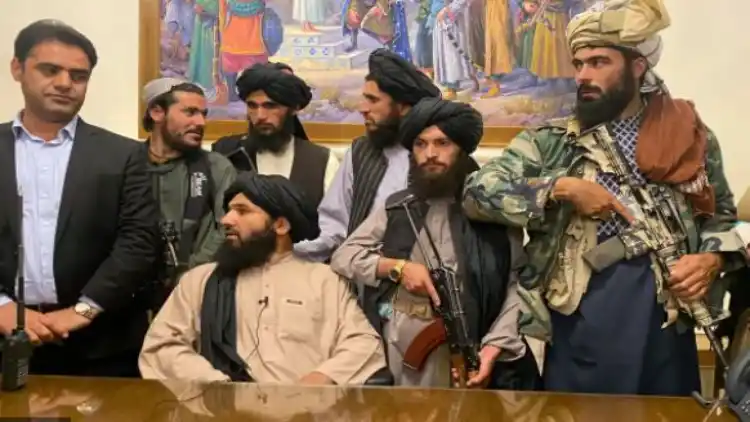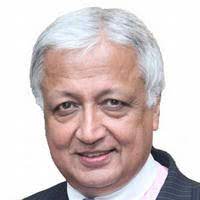

 Deepak Vohra
Deepak Vohra
Despite all the sugar coating on it, the Doha agreement between America and Taliban was an American admission of a lost 20-year long, trillion-dollar war, a repeat of Vietnam without the face-saving device of a Geneva Conference.
Afghanistan was never a challenge to America’s global hegemony, China and Russia are, and America, as Joe Biden said, wants to concentrate on dealing with them.
What the future holds for Afghanistan is amply clear.
The Taliban are turning Afghanistan into a dystopian world of religious bigots, stone-age misogynist thugs and cut-throats. With the Americans and NATO out of the way for the foreseeable future, Afghanistan is a broken country.
The Taliban is not a bunch of wayward kids but hardened brutes, bandits and drug-dealers with prices on their heads, manipulated by people who could have shamed Professor James Moriarty, Sherlock Holmes Machiavellian, consulting criminal mastermind who does not commit crimes himself but uses his intelligence and network of resources to provide criminals with ideas for their crimes and sometimes protection from the law, all in exchange for a fee or a cut of profit.
There never was any question of the Taliban sharing power with the existing Afghan government – why should they?
They had exhausted NATO with their primitive ideology and modern equipment. There will be no new constitution or nationwide elections. The trends were clear in the Doha meeting as the two sides shouted at each other.
One Afghan Government negotiator said: “They thought they were there just to discuss the terms of surrender. They said “We don’t need to talk to you. We can just take over.” The Taliban did not reduce the attacks on the government troops and neither the US nor the UN has lifted sanctions against the Taliban.
In the immediate post-War world, Islamabad was a willing sepoy in Western attempts to contain Communism (Ayub Khan told a visiting American officer that our army is your army, but we have to come to some agreement). The West tolerated Pakistan not because they saw it as a factor for peace and stability in Asia, but because it was a devoted servant. It helped fight the Soviets in Afghanistan because of the money that poured in.
Pakistan increased Afghanistan’s instability by providing intelligence, weapons, and protection to the Taliban and its buddies. It has consistently hosted the worst terrorists in the world and tried to use them for its own purpose.
Following 9/11, Pakistan unwillingly joined the war on terror both because it earned money and it was frightened of America’s might (we will bomb you into the stoneage if you do not cooperate).
In return for fighting the Taliban, in November 2001 Pakistan had begged America to let it evacuate hundreds of top Taliban commanders and their Pakistani advisers including Pakistani intelligence agents and army personnel, and other Jihadi volunteers, from Kunduz, just before its capture by U.S. and the United Front of Afghanistan (Northern Alliance)..The Kunduz airlift is also called the Airlift of evil.
Feeling that their military had become an American mercenary, in December 2007 former Pakistan-trained Mujahedeen formed the Tehrik-i-Taliban Pakistan (TTP ), an umbrella group of assorted militant groups in the tribal badlands between Pakistan and Afghanistan to capture state power through a terror campaign with support from Al-Qaeda and the Afghan Taliban.
Chased out of Waziristan by the Pakistan military in 2014, the TTP regrouped in Taliban-controlled Nangarhar Province of Afghanistan, and has carried out some of the worst atrocities in Pakistan including the 2014 massacre of school children in an army public school in Peshawar.
The first obstacle to the implementation of America’s new game plan in Central Asia could have been a man called Ashraf Ghani, the democratically (if controversially) elected President of Afghanistan.
In March 2020, as part of the US-Taliban Doha deal, he released some 5,000 Taliban prisoners from Afghan jails to facilitate an intra-Afghan dialogue that became meaningless once the Taliban swept through the country.
Ashraf Ghani had outlived his utility. Donald Trump famously called him a crook. His corrupt regime was an impediment to America’s plans for Afghanistan, so he fled in August.
In 2016, on his first outside trip as President, Ghani went to Pakistan and called on the army chief in Rawalpindi even before meeting the President or Prime Minister.
He boasted that he had reset the 13-year-old volatile relationship because Afghanistan’s challenge was not peace with the Taliban but peace with Pakistan. He said that the Pakistani military had made three promises: no Taliban attack against Afghanistan, action against the ruthless Haqqani network, and peace talks between the Taliban and Kabul.
To please his newfound friends, he hit the Pakistani terror group TTP hiding in Afghanistan. Pakistan did not keep any of its promises, except getting a Taliban team to talk to the Afghan government in 2015 by claiming that the Taliban commander Mullah Omar fully backed the talks (Omar had been dead for over two years).
Far from being restrained by Pakistan, the Haqqani network stepped up its Taliban alliance, with Sirajuddin Haqqani becoming the Deputy Leader of the Taliban
Now that the Taliban are back with US approval, what will happen next?
America wants to keep China and Russia and Iran (all are considered enemies) and even Pakistan, on tenterhooks with total instability in Afghanistan.
Its new buddies will create trouble in the neighbouring Central Asian countries by supporting radical movements like the Islamic Movement of Uzbekistan as they have done in the past.
China is afraid that the Taliban will mess around in its restive Xinjiang region, home to millions of Muslim Uighurs, and wants to protect its commercial mining interests in eastern Afghanistan
Not sure about Pakistan’s influence with the Taliban, Beijing reached out directly to the Taliban in July 2021, calling them a “pivotal” force.
China’s Foreign Minister Wang Yi pressed chief Taliban negotiator Mullah Abdul Ghani Baradar during their July 2021 meeting to make a “clean break” with the East Turkestan (Uighur) Islamic Movement. The Mullah smiled.
China has been begging anyone who listens to guide the Taliban and prevent them from becoming terror central (meaning that the Taliban do not listen to China).
The next target, ripe for the picking, is Pakistan, whose subservience to China is well known and whose relationship with the USA is below rock bottom.
Pakistanis stupidly celebrated the Taliban victory with the opium-addicted Prime Minister declaring it the liberation of Afghanistan while his Special Assistant tweeted (with clearance from his boss) that the American-built edifice in Afghanistan had crumbled like a house of cards.
After the Soviets left, Pakistan helped set up a Mujaheddin alliance government in Kabul in 1992, and then dumped it in favour of a Taliban regime in 1996.
Come 9/11, and Pakistan pretended to serve the US in its global war on terror and sent out huge bills for its effort, even as it backed the Taliban, whose Shura or leadership councils were based in Quetta, Peshawar and Miranshah.
Pakistan was both the firefighter and the pyromaniac..
President Donald Trump publicly castigated Pakistan for its perfidy regarding the war on terror, his successor has not spoken even once to the Pakistani Prime Minister.
In late 2020, the Pakistani intelligence head of Islamic State's Khorasan unit was killed by special forces near Jalalabad, according to the Afghan National Directorate of Security.
Another release claimed that of some 400 plus IS captives in their custody, the highest, 299, were from Pakistan, while 34 were from China (presumably Uighurs).
Pakistan still dreams of a puppet regime in Kabul that will formalize the Durand Line (the so-called border).
Following the Soviet withdrawal in 1989 a fellow called Hamid Gul offered Afghanistan to Benazir Bhutto on a platter, by sending thousands of Mujahedeen stiffened by Pakistani troops (and moving as a conventional army) to capture Jalalabad, make it the provisional capital of their favorite Mujahedeen Commander, the mercurial and treacherous Gulbuddin Hekmatyar, gain international recognition, and then slowly take over Afghanistan.
The Soviet trained and equipped Afghan army fought back splendidly.
As Pakistani soldiers’ bodies began to come back, Hamid Gul was sacked and in 2015 did the world a favour – he died
When Pakistan tried to control the battle for Jalalabad, a Mujahideen commander famously asked: "How is that we Afghans, who never lost a war, must take military instructions from the Pakistanis, who never won one?"
The Taliban-sponsored TTP’s resurgence is very bad news for Pakistan.
The ultra-radical group is chafing at the bit and has announced that it intends to capture Islamabad within a year.
Hundreds of its fighters, including many Al Qaeda members, are among the prisoners forcibly released by the Taliban from Pul-e-Charkhi and Baghramjails.
A broke Pakistan is desperately begging the “international community” to forestall economic collapse in Afghanistan, to prevent the present trickle of refugees from becoming a torrent.
Victor Frankenstein’s monster has come back to devour the doctor.
The Afghans do not like Pakistan. Significantly, within two weeks of the US withdrawal, the Kabul airport was repaired and operationalized by a Qatari team, not Pakistani. The Taliban hope to gobble up Pakistan’s Pashtun areas. This will be their reward for playing footsie with America, and will immortalize them in Afghanistan’s collective memory.
Iran has not forgotten the massacre of its “diplomats” by the Taliban in Mazar e Sharif in 1998 along with thousands of Northern Alliance supporting Shia Hazaras – the two countries almost went to war.
It has welcomed the departure of U.S. forces and pledged to work with the Taliban government (to) restore life, security, and durable peace in Afghanistan, but it does not like the ultra-Sunni Islam propounded by the Taliban.
Islamic politics is so unpredictable that by 2013 Iran was recruiting tens of thousands of Afghans to serve in one of the militias it used in Syria.
The new Iranian government was already dealing with a struggling economy and a third wave of COVID-19. Now it faces volatility on its eastern front that will shift Tehran’s focus away from the Middle East, much to the pleasure of Israel.
The former Muslim Soviet Republics faced severe Islamic insurgency in the 1990s (when Communism went out and Islam came in) with the Taliban fostering the Islamic Movement of Uzbekistan that attacked neighbouring Kyrgyzstan and Turkmenistan. They will look to Russia and the USA for support.
Other collateral benefits to America will include the stillbirth of the emerging Chinese-sponsored parallel Quad as the attention of its four putative members will be focused on Afghanistan.
America hopes that it can sit back and enjoy the fun!
It controls the international financial system and has blocked Afghanistan’s foreign exchange reserves.
This is the only logical explanation for what is happening in Afghanistan.
(Deepak Vohra is a senior diplomat, special Advisor to Prime Minister on Lesotho, South Sudan and Guinea-Bissau and Special Advisor to Ladakh Autonomous Hill Development Councils, Leh and Kargil)
